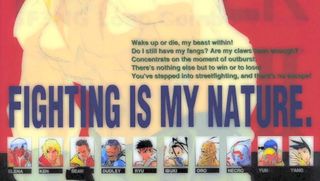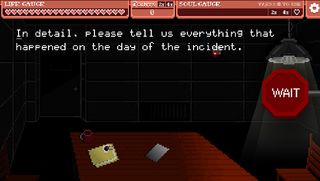Off Radar: The Best Stories You Missed This Week

Contrabrand
You're looking at the best in weapons-grade video game articles from across the web, partner. Stuff that I have to keep off the radar, you know what I mean? It doesn't come cheap. But for you, I make a special deal. You click that little button pointing right and you see what the internet has to say about why Irrational Studios fell apart, life after Kickstarter for a new game studio, becoming a professional fighting game player, and how free-to-play mechanics emerged from the arcades. No extra charge.
Just because I like you--and because I know you'll be sure to tell all your rich friends about me--I'll throw in two strange and stirring browser games at the end. But enough talk. You're here for the Best Stories (and games) You Missed This Week. So let's get going before anyone becomes suspicious.

Read... The final years of Irrational Games, according to those who were there
"However, those affected by recent events and time spent at the studio over the past decade have provided a sense of what led to the end of Irrational. According to those with whom we spoke, the closure was the combined result of unfettered creative freedom, lower-than-expected sales, the butting of heads between Levine and his employees and the unrealistic expectations of big-budget game development."
When Ken Levine announced that Irrational was closing in all but name, I said we may never know the story behind its unexpected demise. Non-disclosure agreements and vulnerable sources, who are rightfully more concerned with finding new jobs than getting the word out, make for an uphill battle. But Chris Plante hustled like a madman to get those sources anyway for this Polygon feature, and thanks to him we have an incredible look inside the last months and years of Irrational.
The feature fills in the details of some common notions about Irrational, like having to work and re-work to meet Levine's notoriously exacting standards. Employees were given substantial creative freedom but they had to defend their end results tooth and nail. As strong as Levine's influence over the studio was, and as many employees had departed by last month, Irrational's closure begins to make more sense. But it still sucks.

Read... Rpublique: Episode 1 Postmortem
"Camouflaj began as a very crunch-heavy studio. Leading up to our Kickstarter debut, we worked days, nights and almost every weekend for four months. We pulled all-nighters, slept in the office, and quickly ran ourselves into the ground. Coming out of GDC 2012, many team members vowed to never crunch again--they were exhausted and began to cite indie developers GDC quotes, 'If youre crunching, youre doing it wrong.' At that time, I agreed. We were ruining peoples lives with crunch, so Camouflaj was going to help blaze a trail and prove that you can ship a high quality independent game without imposing crazy hours."
So you've left your comfortable job at an established game developer, recruited twenty or so like-minded individuals, and brought in half a million on Kickstarter. Now all you have to do is pull that vision of fresh, fun, narratively courageous mobile gaming that enchanted 11,000 backers from your head and stick it on an iPad. Ryan Payton, formerly of 343 Industries and Kojima Productions, tells us how it happened for Republique and Camouflaj in an big, honest postmortem for Gamasutra.
It wouldn't have been an easy task for the big-time studios of Payton's past, and it certainly wasn't easy for his new team. Hearing how his views on issues like crunch--that is, working long hours of overtime--and a flat creative structure shifted in response to practical concerns is interesting. Nobody, least of all Payton, is saying he did it perfectly, but it's valuable information for game creators and consumers alike.

Read... From Small Change to Sponsorships: A Story of Justin Wong
"'I was baited at a young age when I joined EMP,' Wong said. 'I knew most of the group since they were my friends from the arcade. (The leader) 'Triforce' had dreams that this was a business, but to me it was a regular thing. It's funny when you first hear about his dream because it's like lore, but I enjoyed being a part of it because I was playing on a team with my friends. It was a good memory.'"
Timothy Lee tells the story of Justin Wong, one of North America's best fighting game players, in a feature for IGN. If you don't follow the competitive fighting game scene, you may only know Wong as the guy on the other side of the hair-prickling comeback at Evo 2004, but he's done much more in and for the community than get parried by Daigo.
I do wish Lee had included some comment from Wong's former teammates at EMP, with whom he had a prolonged falling out--Lee may have reached out to them, but if so, he didn't say so. One of the most unfortunate things about the fighting game community (or any close-knit community, I guess) is just how catty it can get. Still, it's an interesting look at Wong's rise from arcade shark to tournament master.

Rage Against the Machines
"The free-to-play structure isnt just a business model that somehow got hurriedly tacked onto a game that might have been commercialized in any number of other ways. Rather, its a sophisticated new gloss on the classic playing-for-time model pioneered by the coin-op games of the seventies and eighties--only instead of coaxing pocket change from users, it extracts a kind of surplus value that, in the new digital economy, is infinitely more valuable: it embeds within the actual gaming experience the relentless quest for attention, word-of-mouth, and (ultimately) remuneration that drives virtually every other overcapitalized form of online activity."
At least with an arcade game, you knew you had to pay up front. You had however many quarters were in your pocket, then that was it. But free-to-play games don't live in the arcade; they live mostly in your browser or in your phone (our two favorite hangouts) so they can trade with extra malice on the paying-for-time model Ian Bogost references in a piece for The Baffler.
Bogost observes that the true threat of gaming isn't violent outbursts but rather a massive swindle on vulnerable people. It doesn't matter that most players never spend a single cent when the game can still effectively capitalize on that population of whales. I'm glad to see the European Union is looking into what can be called free-to-play or not, but I hope the process goes further than just calling out certain apps as "with optional purchases."

Play... TrademarkVille
If you live in a kingdom where every word uttered is magically trademarked and removed from circulation, you get pretty good at coming up with synonyms. TrademarkVille is a social commentary/puzzle game that (just like real-life trademark law) gets harder the more people participate.

Play... Icarus Proudbottom's World of Typing Episode 1
Let Icarus Proudbottom and his American Indian Spirit Animal buddy Jerry be your guides to the wonderful world of typing. At least, until something terrible happens Don't let a fear of competitive keyboarding keep you away from this perplexing and enchanting Flash game.

Cease fire
That's it for this week's arsenal, my friends. But these interesting thoughts have a way of finding their way here, you know what I mean? Who am I to stop them! If you liked what you saw, or maybe had some inventory ideas, be sure to share them in the comments below.
Want to read about some more traditional video game ordnance? Check out these 12 guns that are more popular in games than they are in the real world. Want more deep gaming thoughts? Read why permadeath is alive and well.

I got a BA in journalism from Central Michigan University - though the best education I received there was from CM Life, its student-run newspaper. Long before that, I started pursuing my degree in video games by bugging my older brother to let me play Zelda on the Super Nintendo. I've previously been a news intern for GameSpot, a news writer for CVG, and now I'm a staff writer here at GamesRadar.
Most Popular
